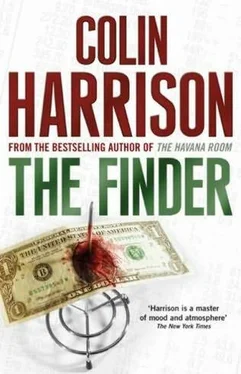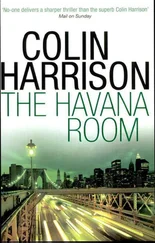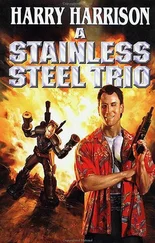Colin Harrison - The Finder
Здесь есть возможность читать онлайн «Colin Harrison - The Finder» весь текст электронной книги совершенно бесплатно (целиком полную версию без сокращений). В некоторых случаях можно слушать аудио, скачать через торрент в формате fb2 и присутствует краткое содержание. Жанр: Триллер, на английском языке. Описание произведения, (предисловие) а так же отзывы посетителей доступны на портале библиотеки ЛибКат.
- Название:The Finder
- Автор:
- Жанр:
- Год:неизвестен
- ISBN:нет данных
- Рейтинг книги:4 / 5. Голосов: 1
-
Избранное:Добавить в избранное
- Отзывы:
-
Ваша оценка:
- 80
- 1
- 2
- 3
- 4
- 5
The Finder: краткое содержание, описание и аннотация
Предлагаем к чтению аннотацию, описание, краткое содержание или предисловие (зависит от того, что написал сам автор книги «The Finder»). Если вы не нашли необходимую информацию о книге — напишите в комментариях, мы постараемся отыскать её.
The Finder — читать онлайн бесплатно полную книгу (весь текст) целиком
Ниже представлен текст книги, разбитый по страницам. Система сохранения места последней прочитанной страницы, позволяет с удобством читать онлайн бесплатно книгу «The Finder», без необходимости каждый раз заново искать на чём Вы остановились. Поставьте закладку, и сможете в любой момент перейти на страницу, на которой закончили чтение.
Интервал:
Закладка:
She listened to the Russian leave the room, his heavy footsteps making the warped old boards creak. Did she dare to come out? Maybe he was waiting behind the door! How did he know she was hungry? Then she crept over and inspected the bag.
Apples, in a bag. Smelled good. Delicious. And yet the worst thing, too, the saddest thing…
She had come such a long way, so far that she no longer remembered every step of the path, dared not think of the distances. Born in the arid plain, on her parents' farm. They did not have running water, only a town pump. Her father had grown up on the farm, never liking it. And he wasn't much of a farmer, either. The hogs got strange diseases that made their noses drip. Her grandfather was allowed to have three apple trees behind the barn. These he fertilized with chicken droppings he gathered from the road with a shovel. Her father had borrowed money from the town council and then had struck off for Shanghai and sold mealworms in the bird market for three years before sending for her mother. Then, a year later, after her mother had prospered selling mealworms and her father had built a little business hauling bamboo scaffolding from one building site to another, they sent for her and Chen. Her grandmother had wept and taken to her bed, saying she had been abandoned by everyone and it was time for her to join her ancestors. Her grandfather, whom she loved more than anyone, ever, more than anyone in the past and anyone she would ever love in the future (except for her children, of course-oh, how she hoped she'd have children someday), had taken Jin Li and Chen in the wagon down to the train station with a little sack full of his own apples, rice balls, and dried pork. He explained that they would be taking a very long train trip. Almost three days. He gave Chen some money-a handful of old bills-and told him that he would have to buy them water and sweets during the trip. Then her grandfather asked her brother to check to see if the train was coming, and when he ran excitedly to look, her grandfather showed her the new bills in his hand. Take off your shoe and sock, quick, he said, and he slipped the bills into her sock and pulled it back on. Do not let older brother know you have this money, he instructed gravely, or he will take it and lose it. I gave him the old bills for water and sweets. Give this new money to mother. If brother loses all his money and you need money, take only one bill out of your sock and tell him you found it. Do you understand? her grandfather asked, the skin folded over his old eyes. Yes, she said, eager to please him, anxious he know that she would do anything he asked of her. This is all the money that I have saved in my life. It is for you and for older brother and for kind mother. She nodded eagerly but did not want to leave him now. She felt suddenly scared. She saw what was happening. You are my little bird and you will fly far, he said, making a little cough. I will never see you again but you will always be my little bird. Then the train came and they rode hard-class on a bench seat for fifty-six hours. It was crowded and the people smelled. The train stopped and you had to go squat in the weeds. Her brother spent all the old bills on sweets and gum and water, but she did not pull out any of the new bills her grandfather had given her. Years later, when she had been a merit student at Harbin Institute of Technology, she had come to understand that each bite of the apples in the bag was the last she'd had of her grandfather. She'd never seen him again. And certainly he was dead now, it had been so long. That was the saddest thing and yet she would never cry about it, ever. She and her brother had lived in a little apartment in a crumbling block in old Shanghai, one room with mold on the window side, long since bulldozed to make way for an elevated highway now clogged with new cars, trucks, city buses. Her mother found work in a factory where she affixed a tiny piece of plastic lettering to the front of DVD players all day long. She used an electric hot-glue gun and had to do eighteen thousand pieces per twelve-hour day if she wanted to be paid at the end of the six-day workweek. About one piece every two seconds. Within two years, as Jin Li and her brother went to school, her father built up the scaffolding company enough that he was able to buy a small plot of ground and build a three-story apartment house. That same year Jin Li's mother became so tired and sick from the long hours of work and the smell of the glue that she fell asleep as she worked and the hot-glue gun shot a long wad of burning adhesive onto her cheek. She was fired from the factory and came home, and Jin Li took care of her. The wound became infected and a doctor they paid came and cut out the infection and cauterized it. It healed but left a jagged, rippling scar and nerve damage that made one side of her mother's mouth droop. Her mother retreated into their house and would not come out. Jin Li and her brother did the shopping. Her father chose to sleep in the fold-out bed in the front room and rarely spoke to her mother. He no longer let her cut his hair and meanwhile began to wear better clothes. Soon her father was dining out with minor government officials, sometimes taking Jin Li's brother to these meetings, where he began to learn the ways of business as it was done in the new China. Meanwhile, Jin Li learned English in school and studied as hard as she could, without passion, she saw now, but as a way of escaping-escaping something, everything. When she was fifteen she received the third highest score on the school tests in all of Shanghai District and that included the children of rich parents who had tutors who knew whom to pay to get a copy of the previous year's test. Her best score was in chemistry. Her mother came to the ceremony, but her father did not. Then came her proudest day: she was admitted to Harbin Institute of Technology, one of the finest universities in all of China, specializing in astronautics, mechatronics and automation, hot-working technology, communication and electronic systems, physical electronics, and optronics. Her team built the first plasma immersion ion implantation equipment in China! But in her third year her professors encouraged her to study American capitalism and information technology. We might need you for something different, Jin Li, they said. And of course her father and now her brother had been behind this, with his government connections. They wanted to use her to make money. Her English, her good looks, her ability to mix. Sometimes we send special people to work in America, they said. Very secret. So she studied American corporations, she read the history of New York City, she translated old copies of Time magazine, and she listened to radio broadcasts about traffic on the Brooklyn Bridge, the Abraham Lincoln Tunnel. She read a funny, old-fashioned novel about New York called Bright Lights, Big City that made no sense to her. She learned about taxis and subways and the Chrysler Building and why Greenwich Village was famous. And then How exciting it had been to come to America! But so strange. With every passing day, every week, she had felt herself changing in ways she did not understand. America was much different from what she'd expected. People were so… so free. They had the freeness in them. She hated them at first, thought them foolish and weak. But then a few years went by. She began to make a lot of money-what Americans called "big money"-for her brother and his fellow pig-men investors. The government supervisor from the consulate who was supposed to check on her every two months seemed less interested in checking up on her. China was changing rapidly, and yet she was not supposed to return. I am so dislocated, Jin Li thought, so "disjointed"-another vocabulary term that maybe wasn't quite correct. I am not in my country, I am not in my own self. She read the newspapers relentlessly, finding the New York Post and Daily News easy enough, and then after a year moving on to the New York Times. Always she was careful, especially on the phone. She knew about the American government computers searching for information, listening to phone calls, seeking word patterns, filtering through e-mails and search strings, linking hundreds of variables to hundreds of other variables. That was cutting-edge, major league. Although China's population was much bigger than America's, and Shanghai much larger than New York, she understood financial scale better now, after sifting through all those pieces of corporate trash. The American companies were so large! They operated all over the world! How tiny was her brother's enterprise! So small it should not be noticed. But someone had noticed. Who?
Читать дальшеИнтервал:
Закладка:
Похожие книги на «The Finder»
Представляем Вашему вниманию похожие книги на «The Finder» списком для выбора. Мы отобрали схожую по названию и смыслу литературу в надежде предоставить читателям больше вариантов отыскать новые, интересные, ещё непрочитанные произведения.
Обсуждение, отзывы о книге «The Finder» и просто собственные мнения читателей. Оставьте ваши комментарии, напишите, что Вы думаете о произведении, его смысле или главных героях. Укажите что конкретно понравилось, а что нет, и почему Вы так считаете.












